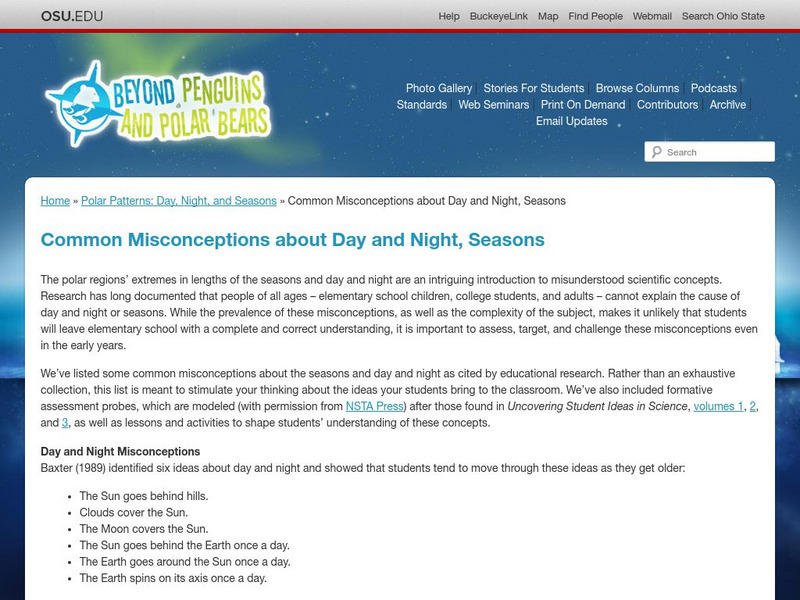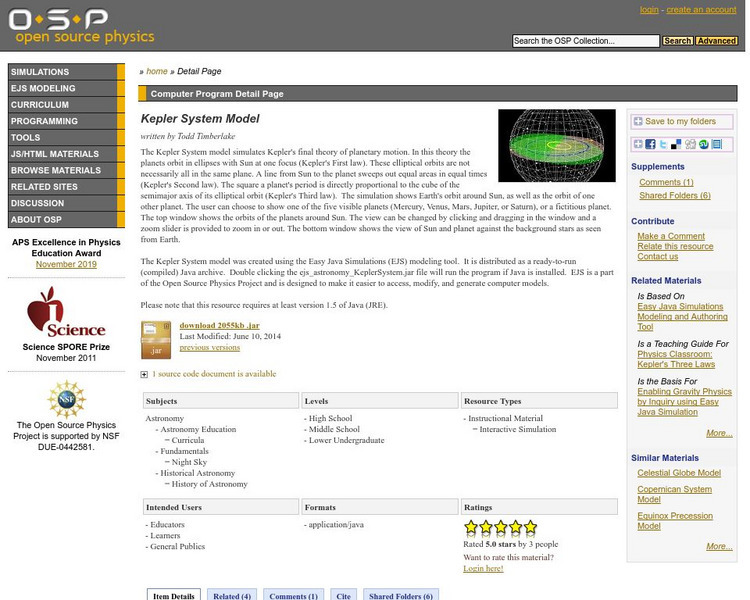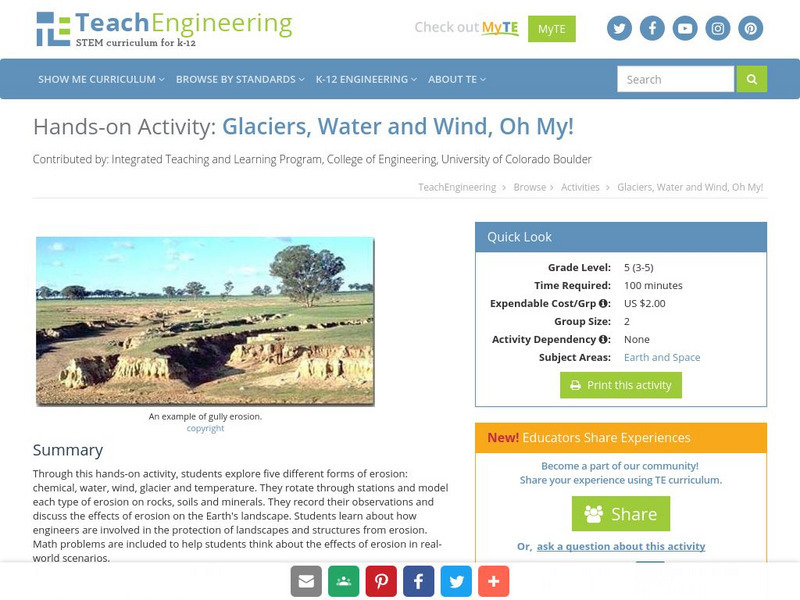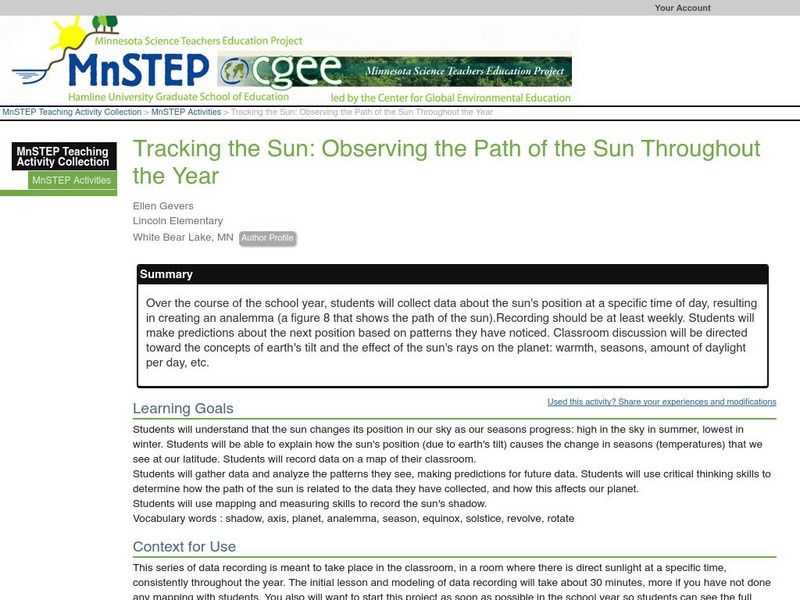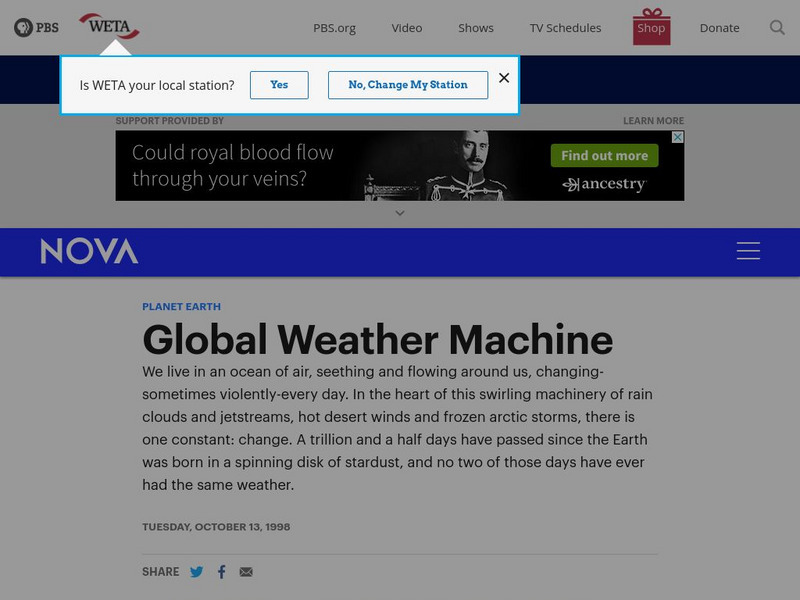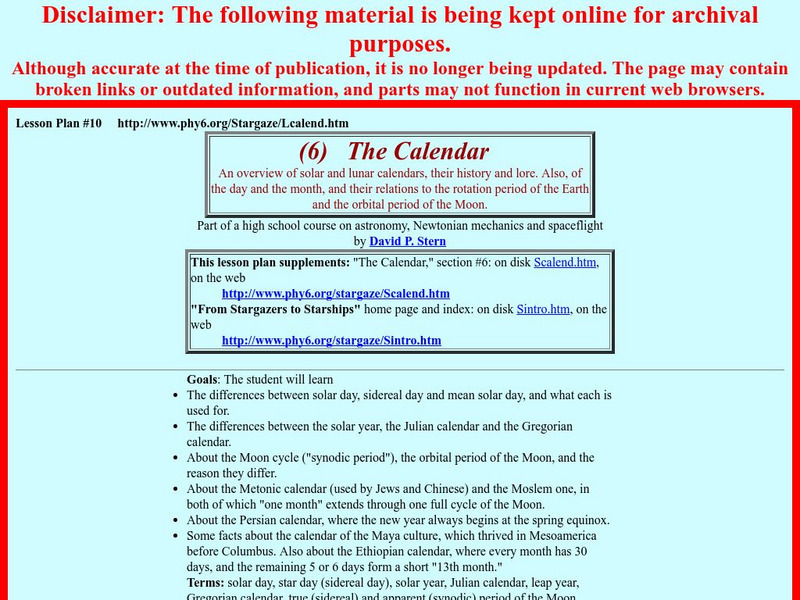University of Illinois
University of Illinois Extension: Tree House Weather Kids: What Causes the Season?
Explore what causes the change of seasons on the Earth.
Curated OER
Global Wind Pattern on the Earth Without an Ocean, Axiz Tilt, and Rotation.
Global wind pattern on the earth without an ocean, axiz tilt, and rotation.
Texas Education Agency
Texas Gateway: The Sun Is the Center of the Solar System
See what you know about the solar system by taking this brief interactive quiz and learning module.
Ohio State University
Beyond Penguins and Polar Bears: Common Misconceptions About Day and Night
Misconceptions about the causes of seasons and day and night are common through all ages. Use the information on this site to help your students understand these concepts. Included are links to many resources and lesson plans for...
PBS
Pbs Learning Media: Sunspots on the Move
The following videos show sunspots using wavelengths of light that the human eye cannot see. Watch sunspots emerging on the earth's surface, a sunspot moving across the earth's surface, and the rotation of the sun as a sunspot evolves...
American Association of Physics Teachers
Com Padre Digital Library: Open Source Physics: Kepler System Model
This site from Open Source Physics offers a file with a simulation of Kepler's theory of planetary motion, tested with the Earth rotating around the sun and another planet of the user's choosing. The download requires Java.
TeachEngineering
Teach Engineering: Glaciers, Water and Wind, Oh My!
This hands-on activity explores five different forms of erosion (chemical, water, wind, glacier and temperature). Students rotate through stations and model each type of erosion on rocks, soils and minerals. The students record their...
OpenStax
Open Stax: Gyroscopic Effects: Vector Aspects of Angular Momentum
From a chapter on Rotational Motion and Angular Momentum in a Physics textbook. This section of the chapter explains how to use the right-hand rule to determine direction for angular velocity, momentum, and torque. Also discusses the...
PBS
Pbs Learning Media: Giving Rise to the Jet Stream
This interactive activity from NOVA Online uses animation and graphics to offer a detailed explanation of the jet stream. A thorough account is given of the role played by the Sun's heat and Earth's shape and rotation, among other factors.
Science Education Resource Center at Carleton College
Serc: Tracking the Sun: Observing the Path of the Sun Throughout the Year
Over the course of the school year, young scholars collect weekly data about the sun's position at a specific time of day, resulting in creating a figure "8" that shows the path of the sun called an analemma.
BioEd Online
Bio Ed Online: Sleep and Circadian Rhythms
The following lessons help students from grades 6-8 understand sleep and circadian rhythms. Lesson topics iinclude: day and night, seasons, sundails, clocks, sleep and sleep patterns and sleeping in space.
American Association for the Advancement of Science
Aaas: Project 2061: Topic: Weather and Climate Ii: Seasonal Differences
[Free Registration/Login Required] Create a science test that checks for student understanding in science, for common misconceptions, as well as for correct ideas. This is a list of key ideas related to Weather and Climate II: Seasonal...
Utah Education Network
Uen: Trb 3:1 Investigation 6 Celestial Model
Third graders will gain an understanding of why stars appear to move across the night sky.
PBS
Pbs Learning Media: Global Weather Machine
In this illustrated essay from NOVA Online, explore the cyclical process of weather creation and the effects of El Nino on the global weather system.
CK-12 Foundation
Ck 12 Exploration Series: Simulations: Physics: Clarke's Dream
[Free Registration/Login Required] Learn about geosynchronous orbits and their use in satellite communication.
E-learning for Kids
E Learning for Kids: Science: Atlantic Ocean: Day and Night
This module explores day and night. Learn about what we see during the day and night and why we see what we see.
Better Lesson
Better Lesson: Our Stars
In this lesson, students will observe and communicate how the stars are in the sky both day and night. The extremely detailed lesson includes photos and videos of the lesson in actions, examples of student's work, materials, parent...
Better Lesson
Better Lesson: Our Sky
What objects are in the day sky and the night sky? How do they seem to move? Come and explore with us as we discover the sun, moon, planets and stars! This detailed lesson plan includes pictures and videos of the lesson in action,...
PBS
Pbs Learning Media: Virtual Pendulum
This interactive activity from ZOOM offers a chance to experiment with a virtual pendulum and to see how it can be influenced by a variety of factors.
Utah Education Network
Uen: Measuring Wind Speed
Fourth graders measure wind speed over the course of a week and graph the results.
Utah Education Network
Uen: Trb 3:1 Investigation 5 Making a Sundial
Make a sundial and learn how to use it.
NOAA
Noaa: Southern Region Weather: Global Circulations
"Global Circulations explain how air and storm systems travel over the Earth's surface. The global circulation would be simple (and the weather boring) if the Earth did not rotate, the rotation was not tilted relative to the sun, and had...
Other
Bad Astronomy/phil Plait: Tides and Why Our Days Are Getting Longer
Why does the Moon always shows the same face to the Earth? Why is the Moon's rotation period the same as the length of time it takes to orbit the Earth? Why are there two tides a day? These questions and more are answered here.
NASA
Nasa: From Stargazers to Starships: The Calendar
A lesson plan that gives an overview of solar and lunar calendars, their history and lore. Also, of the day and the month, and their relations to the rotational period of the Earth and the orbital period of the Moon.For versions in...
Other popular searches
- Earth's Rotation
- Earth Rotation
- Earths Rotation
- Earth Rotation Revolution
- The Earth's Rotation
- Earth Rotation Seasons
- Earth's Rotation Craft
- Earth Rotation Around Sun
- Earth's Rotation Seasons
- Earth's Rotation Orbit
- Earth's Rotation and Seasons
- Earth's Rotation on Axis





